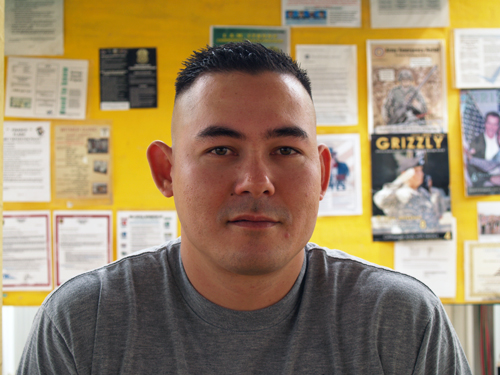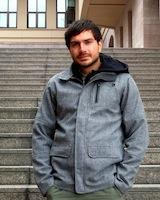
The Life and Opinions of Captain Donald Lipscomb

Captain Donald Lipscomb on base in Baghdad. (Dimiter Kenarov)
[I met Captain Lipscomb in Baghdad. The following entry is an arranged text, culled from my conversations with him.—Dimiter Kenarov]
My Vietnamese name is Le Hoang Dung. My American name is Donald Lipscomb.
I was born in Vietnam in 1973. It was the year major combat ended, the year things started to fall apart. Father was a surgeon with the US Air Force. He met my mother in Saigon, on an American military base. That’s what I’ve been told.
Father went back to America the year after I was born. Mother took off after him soon after. She left me with my grandparents in Vietnam.
It was difficult, growing up. Always struggling. We left Saigon and moved to a farm near Lameng. Five people in all. My grandparents, my aunt, her husband, and me. I didn’t know much back then. Times were difficult. All the kids were picking on me. Growing up, I had to fight almost every day. Fistfights. Because I was half-white, half-Vietnamese nobody liked me. In 1975, when the Communists took over, grandpa had to hide me in a closet. He shaved my blond hair, rubbed charcoal all over me. Everybody knew what the Communists would do, if they found me.
My grandparents were poor. We grew rice but didn’t have much farmland. We always struggled. We’d cook a little rice, make soup out of it, so we’d have enough food for the family. I always wished I had my parents with me. I’d see kids from the neighborhood, their parents hugging them, and I’d start crying. It was difficult, but I was grateful I had my grandparents. They gave me their love and helped me survive.
I dropped out of school when I was in fifth grade. My grandparents didn’t have the money to pay for my schooling. I was twelve. At thirteen I started working the paddy fields, away from home, at the town of Mabua, by the border with Cambodia. I had to harvest rice, do all kinds of farm work. I was gone six to nine months every year.
When I was eighteen, I found out I could go to America, my dad being American. I didn’t know any English. I could barely write in Vietnamese. I left Vietnam in 1990. Before I arrived in the US, I was at a refugee camp in the Philippines. There I received the first letter from my mother.
I met my mother on May 16, 1991, in Seattle, Washington. There was a lot going through my head, but when I met her she didn’t show any emotion. At that point it didn’t really bother me. She told me she’d wanted to go back to Saigon but couldn’t. In the States she had married a man, not my father. And then, I guess, what she had left behind had started to fade away.
My mother told me my father’s name: Lipscomb. She told me he lived in Jackson, Mississippi. The Red Cross helped me track him down. The first time I spoke to my dad I could only say “Hello” and “How are you?” Later, my dad sent me a letter saying he apologized he hadn’t taken care of me. And that he wanted to do whatever it takes to pay back for the time he had lost. That letter was read to me by an interpreter. That letter touched my heart the most, and those words I remember to this day and will remember for the rest of my life.
I went to Job Corps in eastern Washington State. It’s the place where they give you an education and a vocation. I slowly started to learn English. I didn’t have good schooling, so I had to start everything from scratch. Not only language but everything. At Job Corps I learned how to cook. That was my vocation. My English was getting better and I spoke to my father more and more often. After graduation I started working as a cook. My first job was flipping burgers at the Burger King at Sea-Tac International Airport. That was 1993. I was sending money back home to my grandparents, helped them buy a house in Saigon. I even went to visit them.
In 1997 I decided to go to college. I started taking college classes at South Seattle Community College. I guess I decided to go to college because of my father. He was a doctor and I didn’t want him to have an uneducated son. I wanted him to be proud of me. It was hard, working full-time and studying. I failed a lot of classes but didn’t get embarrassed. I did not give up; that’s the whole thing. It took me four years to get my AA.
Right after graduation, in May 2001, I decided to join the American military. Vietnam didn’t even let me finish school. The American government opened its arms out for me. They gave me education, gave me opportunity. And that’s when I said to myself, it’s time to give something back to this country.
My father was happy when he heard I’d joined the military. He didn’t have any objections. We didn’t talk much about his experience in Vietnam. I never really asked him about that. As a doctor, he hadn’t seen much fighting.
The day my basic training began was on the morning of September 11th. I remember I was at Fort Sill, Oklahoma. I had just received my first military ID. Then everything stopped that morning. It was very emotional. We were pissed off because our country was being attacked. We wanted to do whatever it takes. If we had to go to war, we’d go to war.
My unit didn’t get deployed, so I went back to university, Washington State University. I majored in international business and management of information systems. I jointed the ROTC. It took me two and a half years to get my BA and my commission. I found acceptance in the Army. There’s nobody more accepting than the military. That common bond, you can’t get it anywhere else.
After graduation, I moved down to California. I was with the engineer branch. I went to Officer Basic Course in 2005. Two months later, I went to Afghanistan as a platoon leader. It was a great experience because I was with an engineers’ company and we helped with the building of roads and schools for the Afghanis. And they were happy that we were there because they didn’t have any roads. They’d invite us to their houses for tea. If they found an IED, they’d come tell us. I came back from Afghanistan in 2007.
In Iraq now, I’m doing my job. I’m helping with the rotation of units. As a military man it doesn’t matter for me what the public perception is. I’m doing my job. We’re called upon to do our job. Wherever that is, doesn’t matter if it’s a good war or a bad war, it’s our job to defend out Constitution and our country.
Of course, growing up in Vietnam and seeing the aftermath of the war over there was important for me. Knowing how the American troops pulled out and left devastation for all of us who supported them. I don’t want to see the Iraqi people go through what we went through. And that’s my personal view. And I’m kind of happy we’re here and we’re making a difference. Even though I haven’t been outside of the base, I know from what people say that we’ve made good progress, we’ve helped this country develop and helped the good people in Iraq. Hopefully, by the time we pull out, the Iraqi people will be able to sustain themselves.
Dimiter Kenarov is in Baghdad with a grant from the Pulitzer Center on Crisis Reporting. Learn more about this project on the Pulitzer website.

